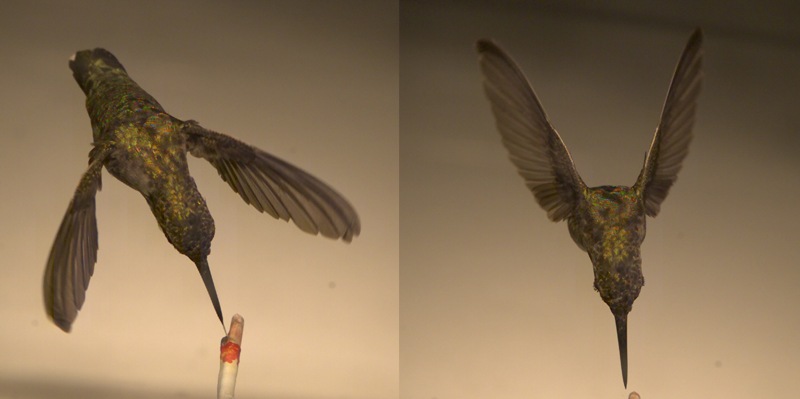
12 February 2020
In 2014, Dr Sridhar Ravi, University of New South Wales, received a Travelling Fellowship from Journal of Experimental Biology. Using the grant, he visited labs run by Professor Andrew Biewener and Professor Stacey Combes in the Department of Organismic and Evolutionary Biology at Harvard University. Although the original experiments didn’t quite go to plan, the team’s back-up plan was a success and earlier this year a paper based on the data from the trip was published.
Originally, the trip intended to investigate whether hummingbirds combined visual information with mechanosensory feedback to stably hover near flowers during feeding. Once the experiments were underway however, it became clear that the hummingbirds were not behaving as expected and that the data wasn’t suitable for analysis. “We decided to instead pursue a study on the flight-control strategy of the birds,” explained Dr Ravi. This study proved to be successful and resulted in the recently published paper.
“From this experience, my advice to candidates applying for the fellowship would be to work closely with the host from the start of the research plan. Having contingency plans significantly increases the breadth of successful outcomes.”
A chance encounter with Dr Nicolai Konow during a visit to Brown University uncovered an overlap in their research interests that turned into a collaboration on the project. “The Travelling Fellowship provided the platform to realise this collaboration, which in turn expanded the scope of the investigation,” said Dr Ravi. The team took measurements from the muscles of the birds while they were trying to remain stable in the perturbing wind. The recordings taken during the fellowship significantly increased the quality of data and provided deeper insights into the mechanics of hummingbird flight.
Dr Ravi looks back on his time in Boston with fond memories. An engineer by training, the time in Professor Combes’ lab taught him about working within multi-disciplinary teams, performing biological experiments and carrying out data analysis. “The experience was instrumental in building my confidence and knowledge about working with animals,” expanded Dr Ravi. “I also learnt a lot from Stacey about people management and elements necessary for running a successful lab.”
“Creating a positive and stimulating environment is pivotal for the healthy running of a group – my time in Boston provided me with an opportunity to learn these skills from a truly excellent group leader.”
Dr Ravi is firm in his belief of international collaborations. “These experiences are invaluable in building research linkages, learning new techniques and expanding knowledge,” he explained. “I advise ECRs to not discount themselves and apply for these fellowships. They provide great opportunities to develop research ideas and write proposals in a persuasive manner. It is also important to be undeterred by unfavourable outcomes and take them as feedback for improvement.”
Applications for the next Travelling Fellowships close on 6 March – find out more and how to apply.








You must be logged in to post a comment.